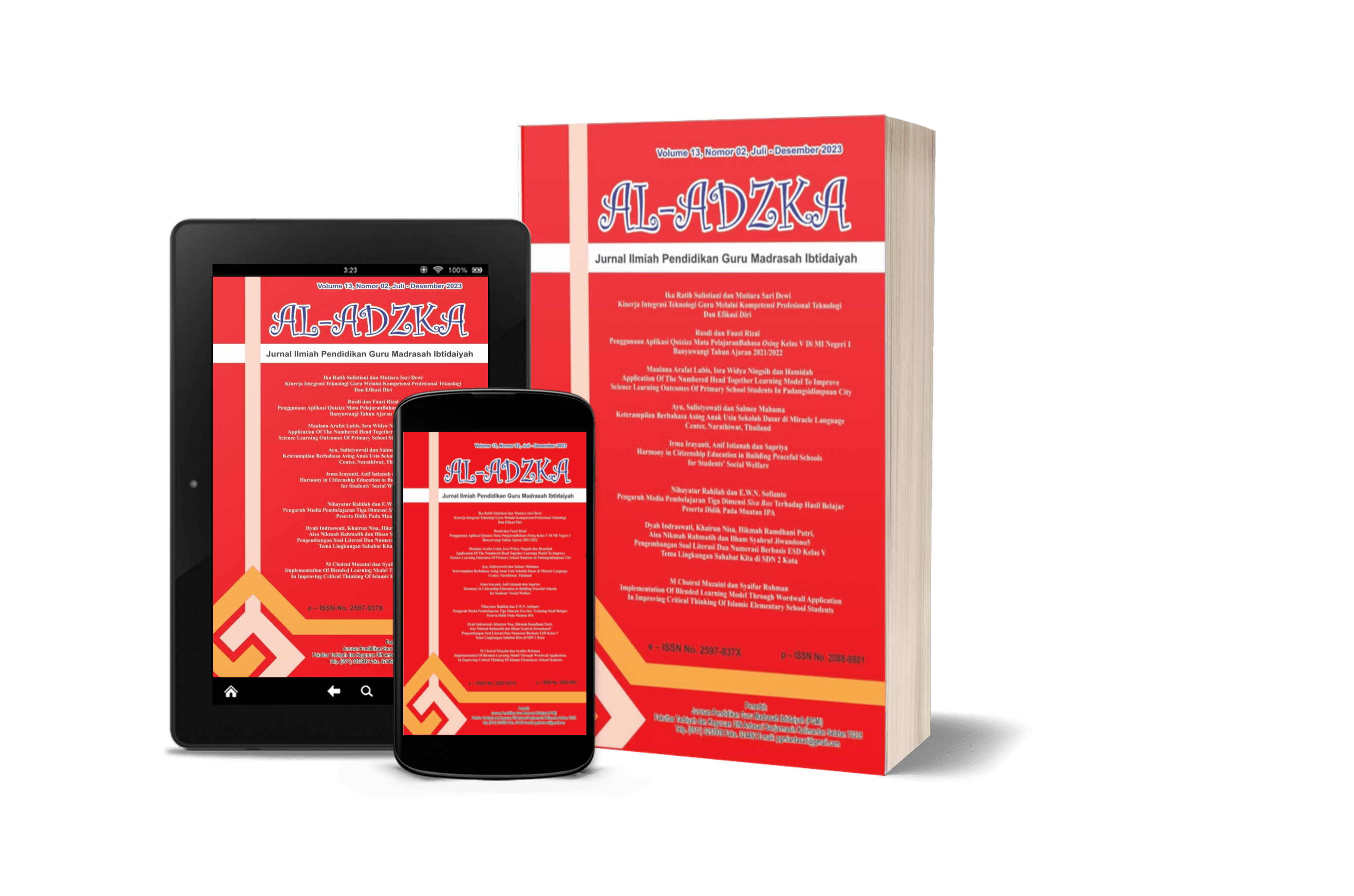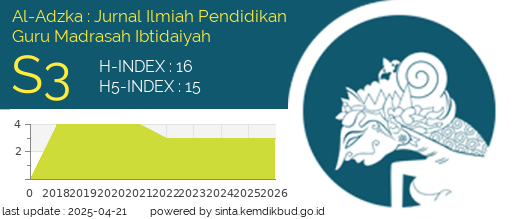The Influence of Financial Literature on The Spirit Of Entrepreneurship on Students of Islamic Primary School
DOI:
https://doi.org/10.18592/aladzkapgmi.v11i1.4055Abstract
The objectives of this study are 1) Knowing how to implement Financial Literacy education for children in MI East OKU. 2) Knowing how the entrepreneur spirit in children in MI East OKU. 3) Knowing how big the influence of financial literacy on the entrepreneur spirit of the children of MI East OKU. The method used is mixed methods. Qualitative methods are used to find the hypothesis, while quantitative methods are used to test research hypotheses. Sampling using purposive sampling technique by determining the criteria for financial literacy and entrepreneur spirit. The sample in this study was MI Nurul Iman with MIN 02 East OKU based on observations that met the criteria. Qualitative data collection techniques using observation and interviews while quantitative using a questionnaire. Quantitative data analysis techniques using calculations and simple linear regression. Based on calculations, financial literacy data obtained a value of 73% of the expected. While the entrepreneur spirit of students is 75% of what is cultivated. Furthermore, the effect of the two using simple linear regression obtained sig of 0.029 <0.05 so it can be concluded that H0 which reads there is no influence between financial literacy on the entrepreneur spirit of students is rejected, and Ha is accepted which means that there is an influence between financial literacy on the entrepreneur spirit of students. From the results of the study, it can be concluded that there is an influence of the application of financial literacy on the entrepreneur spirit of children in MI East OKU.References
Akmal, H., & Saputra, Y. E. (2016). Analisis tingkat literasi keuangan. JEBI (Jurnal Ekonomi Dan Bisnis Islam), 1(2), 235-244.
Arikunto, S. 2013. Prosedur Penelitian: Suatu Pendekatan Praktik. Jakarta: Rineka Cipta.
Creswell, J. W. (2010). Research design: pendekatan kualitatif, kuantitatif, dan mixed. Yogjakarta: PT Pustaka Pelajar.
Falikhah, N. (2017). Bonus Demografi Peluang dan Tantangan Bagi Indonesia. Alhadharah: Jurnal Ilmu Dakwah, 16(32).
Kemdikbud, 2016. Satgas Gerakan Literasi Sekolah, “ Menumbuhkan Budaya Literasi di Sekolah”, Buku : Saku Gerakan Literasi Sekolah
Krishna, A., Sari, M., & Rofaida R. 2010. Analisis Tingkat Literasi Keuangan di Kalangan Mahasiswa dan Faktor-faktor yang Mempengaruhinya–survey pada mahasiswa Universitas Pendidikan Indonesia.
Mulyadi, S., & Trizki, L. (2012). Financial Parenting: Menjadikan Anak Cerdas dan Cermat Mengelola Uang. Noura Books.
Mulyadi, Seto. 2007. Home Schooling Keluarga Kak Seto, Bandung: Kaifa.
Nurhafizah. 2014. Bimbingan Awal Kewirausahaan pada Anak Usia Dini. Jurnal Konseling dan Pendidikan, Volume 6, No 2, 2018, Hlm 62-66.
Otoritas Jasa Keuangan . (2013). Strategi Nasional Literasi Keuangan Indonesia. 03 Juli 2019. www.ojk.go.id
Rapih, S. (2016). Pendidikan Literasi Keuangan Pada Anak: Mengapa dan Bagaimana?. Scholaria: Jurnal Pendidikan dan Kebudayaan, 6(2), 14-28.
Remund, David L. 2010. Financial Literacy Explicated: The Case for a Clearer Definition in an Increasingly Complex Economy. The Journal of Consumer Affairs, 44 (2), 276-295.
Reski, N., Taufik, T., & Ifdil, I., 2017. Konsep Diri dan Kedisiplinan Belajar Siswa. Jurnal IICET. Vol. 3. No. 07.
Rohmah, M. (2019). INTERNALISASI NILAI-NILAI PANCASILA MELALUI PENDIDIKAN EKONOMI. UTILITY: Jurnal Ilmiah Pendidikan Dan Ekonomi, 3(2), 85-94.
Sina, Peter Garlans. 2012. Analisis Literasi Ekonomi. Jurnal Ecnomia, volume 8, No.2, Oktober 2012
Sina. 2014. Financial Efficacy dan Financial Satisfaction : ditinjau dari perbedaan Gender.Jurnal Manajemen. 12 (2), 173-184.
Sugiyono. 2017. Metode Penelitian Kuantitatif, Kualitatif, dan R&D. Bandung : Alfabeta, CV.
Sukardi. 2011. Metodologi Penelitian Pendidikan Kompetensi dan Praktiknya. Jakarta: PT Bumi Aksara
Yushita, A. N. (2017). Pentingnya literasi keuangan bagi pengelolaan keuangan pribadi. Nominal: Barometer Riset Akuntansi dan Manajemen, 6(1), 11-26.
Downloads
Published
How to Cite
Issue
Section
License
Authors who publish with this journal agree to the following terms:
- Authors retain copyright and grant the journal right of first publication with the work simultaneously licensed under a Creative Commons Attribution 4.0 International that allows others to share the work with an acknowledgement of the work's authorship and initial publication in this journal.
- Authors are able to enter into separate, additional contractual arrangements for the non-exclusive distribution of the journal's published version of the work (e.g., post it to an institutional repository or publish it in a book), with an acknowledgement of its initial publication in this journal.
- Authors are permitted and encouraged to post their work online (e.g., in institutional repositories or on their website) prior to and during the submission process, as it can lead to productive exchanges, as well as earlier and greater citation of published work.












